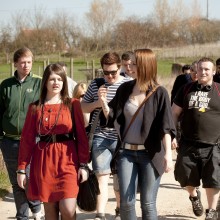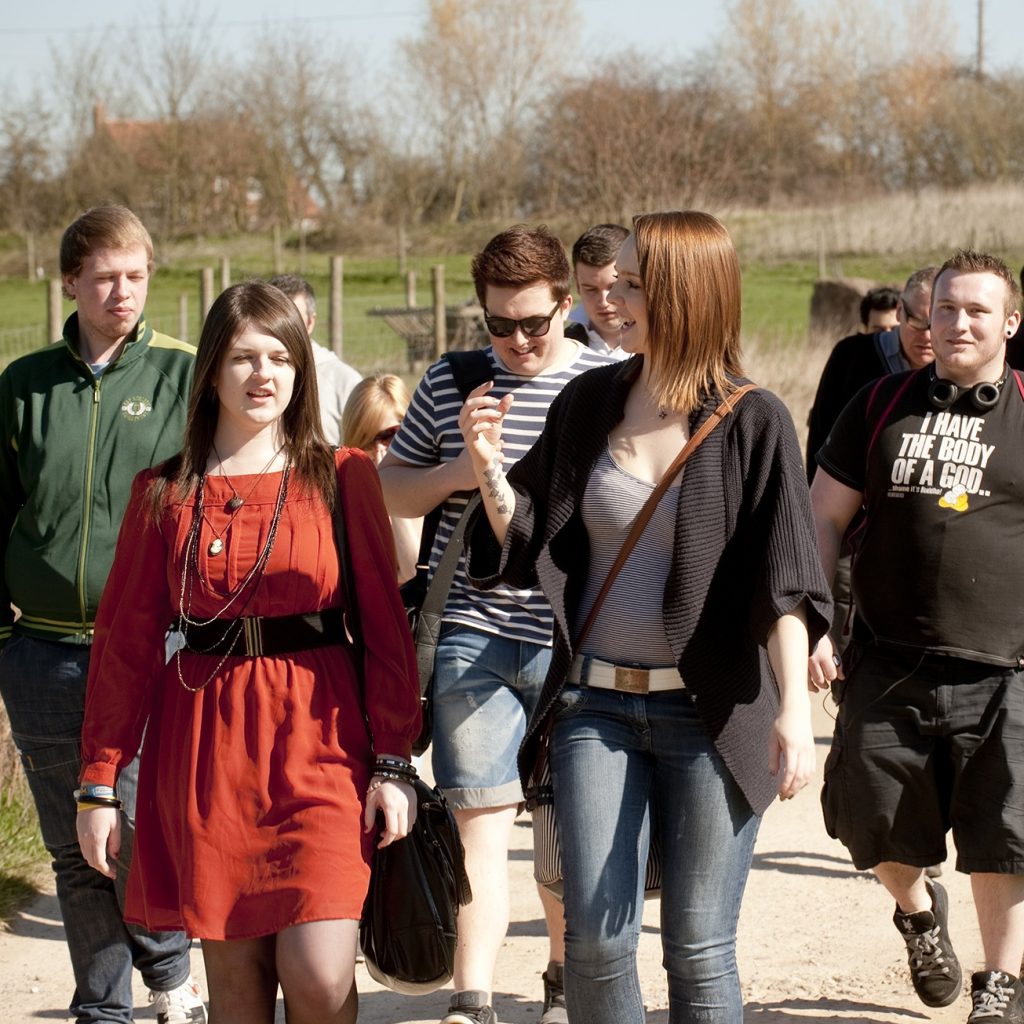Over the past 18 years we’ve hosted thousands of students of energy, water, and environmental sciences but increasing number of visits from other strands of academia is both heartening and fascinating.
Recently we hosted Nottingham University’s School of Mathematics, as part of their work on MASS: ‘Modelling and Analytics for a Sustainable Society‘, and are delighted to hear we were cause for both inspiration and optimism.
“HHP showed me that I was wrong and it is possible to live in a (much more) sustainable way without diminishing our quality of life. I would even argue that the ‘Hockerton lifestyle’ might even be far more enjoyable than the busy, consumption-focused lifestyle most of us enjoy”
“Highlights on the day included “the house tour as we got to see how it all came together in reality”, “the aquaponics, as this was not something I was aware of before, the conservative and careful use of water (e.g. less filtered water for showering and the toilet), their own water filtration systems and being off the grid for water”.
“[we] were all surprised at the toasty warm floor despite the absence of any central or secondary heating!”
You can read their views in full here, or contact us to find out how we can bring your area of work or study to life for your students, colleagues or clients.
 Hockerton Housing Project is featured in a new book, The ‘One Planet’ Life: A Blueprint for Low Impact Development. The guidebook has been written ‘for everyone on the path towards a way of life in which we don’t act as if we had more than one planet Earth. The book also represents a manifesto for a change in attitude towards land use’.
Hockerton Housing Project is featured in a new book, The ‘One Planet’ Life: A Blueprint for Low Impact Development. The guidebook has been written ‘for everyone on the path towards a way of life in which we don’t act as if we had more than one planet Earth. The book also represents a manifesto for a change in attitude towards land use’.
You can get a taster in this informative blog about our development by the author David Thorpe, who is also a founder and core group member of the One Planet Council, and former director of publications at CAT.
If you want to see it for yourself, come on our next tour.

 Hockerton Housing Project has been hosting tours for over ten years, showing over 20,000 people around the Project and its homes to help them understand how homes and communities can meet the energy and environmental challenges of the 21st century.
Hockerton Housing Project has been hosting tours for over ten years, showing over 20,000 people around the Project and its homes to help them understand how homes and communities can meet the energy and environmental challenges of the 21st century.
The most frequent visitors come from our local universities in Nottingham, Derby, Sheffield, Loughborough and Lincoln but we’re keen to see more – both from other universities and from a greater range of courses. Our Project is not just about the housing or the technical infrastructure; it can be used to illustrate a range of studies including the politics of communities and the role of sustainability in health services.
Feedback suggests a visit to us can really inspire students…
Thanks again for a great day and for inspiring my students!
Reader in Environmental Geography, Geography Department,University of Leicester
It was a super experience and the students were buzzing all the way home.
Associate Professor, School of Politics and International Relations, University of Nottingham
Many thanks for another superb visit. It gives the students a real insight into the options for more sustainable living and really gives them something to think about.
Queen Elizabeth High School for Girls
I’d just like to thank you personally for inviting us in your homes and inspiring future generations with your amazing work. It was such a productive experience as we got to see everything we’ve been taught in our module in real life. I thought it was all just theory but to see it up and running and so successful gave me great joy.
Engineering student, Loughborough University
We’ve prepared a short guide to these visits for lecturers and teachers, and are keen to hear from lecturers how you think we could help you bring sustainability to life in your classroom or through a visit to Hockerton Housing Project.
We always welcome feedback from visitors, but rarely get as full a review as this…
I am in the Oil Industry and a pilot neither, I admit, the greenest of occupations. My Wife and I faced a major renovation and it seemed sensible to come to listen and learn.
What did I learn?
-A Hockerton house is not a ‘magic’ house.
-Don’t stick a B&Q windmill on top of your house
-It is highly unlikely many of us could achieve what Hockerton has, but, we can all do something.
-the first step is to insulate, don’t waste energy.
-use ‘airlocks’
What do I know?
-conventional energy cost are going to rise.
-If I had the last barrel of crude oil in the world , I would not just burn it.
-If we don’t do something about carbon, its going to get hot and whilst it probably won’t affect conceited (very lucky) little me it is going to hurt those most in need. Millions of them.
-There are positive things we can do and very simple behaviours we can adopt that help; just that little bit.
So what did we do?
-Insulate! Get the house up to modern standards and prevent the energy haemorrhage.
-Build ‘airlocks’ and adopt the rule of Arctic living; we don’t open one airlock door until we have closed the other.
-Underfloor heat. Small delta T over a very large area is very efficient. Reduce to a minimum heating in areas not in use. [Here delta T is the temperature difference across two surfaces, how does it work]
-Build a conservatory to capture the heat from the sun. Isolate it in Winter or when there is no sun.
-Install GSHP: We yet to have long term use stats but advertised efficiency of 1:4 seems common sense. (Although at HHP our experience has not been so good, find out here.
-install a modern woodburner and have it ‘shared’ between two rooms by a little clever design. How can something so simple be so efficient?
-configure the kitchen to make the most of recycling so that it overcomes lazy human nature
-install a quooker; ie boil exactly what you use. No waste. (again…not sure of the stats over the long term but we will see)
-compost, harvest rainwater , grow our own and keep chickens. In terms of cost time and effort , no it is not effective but, it is a pleasure, tastes great (eggs and food, not the compost) and helps just that little bit.
-develop a ‘stingey’ attitude and aim to use and re-use everything. After a short while it becomes a habit.
In conclusion:
A visit to Hockerton is inspirational and motivational. We are doing a little bit as a result.






